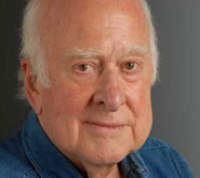Oct 9 2013
Eminent scientist Professor Peter Higgs, one of the world's leading theoretical physicists and the man after whom the Higgs boson is named, has been awarded jointly with Professor Francois Englert the Nobel Prize in Physics 2013.
 Professor Peter Higgs. Image by Peter Tuffy, University of Edinburgh
Professor Peter Higgs. Image by Peter Tuffy, University of Edinburgh
Professor Higgs, who received an honorary degree from the University in 1997, and Professor Englert were part of a small group of physicists who carried out ground-breaking theoretical work in the 1960s, leading to the development of the 'standard model' of particle physics. This model is our best understanding of the laws of nature at the most fundamental scale, which governed the development of our Universe soon after the Big Bang.
Professor Higgs predicted the existence of a unique type of fundamental particle - now named the Higgs boson in his honour - which is essential in allowing the mathematics of the standard model to work. The existence of the boson was a matter of intense speculation for 50 years, until its final discovery last year at the CERN Large Hadron Collider (LHC) - the world's most powerful particle accelerator.
The discovery of the Higgs boson was made independently in 2012 by two huge international experiments. The collision data which provided the evidence for the Higgs boson was processed and filtered through electronics and computer systems designed and developed by researchers at the University of Bristol.
Professor Dave Newbold from the University’s School of Physics said: "The work of Higgs and Englert was at the centre of a series of profound insights in theoretical physics in 1960s and 70s, which revolutionised our understanding of matter, space and time. For decades, the confirmation of Higgs' prediction of a new particle with unique properties remained the 'holy grail' of particle physics - its discovery now tells us that we are probably on the right track in our pursuit of the fundamental laws of nature.
“I'm sure the whole UK physics community wishes to congratulate them both on this richly-deserved recognition of their work. The award of a second Nobel Prize in five years to a UK physicist will be another big boost to the field.”
Professor Higgs lived in Bristol from 1941 to 1946, when he attended Cotham Grammar School. His career in physics was partly inspired by the work of another famous alumnus, Paul Dirac, who won the Nobel Prize in 1933 for combining quantum mechanics with Einstein's relativity. Last year, the retired Edinburgh University physicist gave a scientific lecture in Bristol’s School of Physics, which was attended by over 600 staff and students.